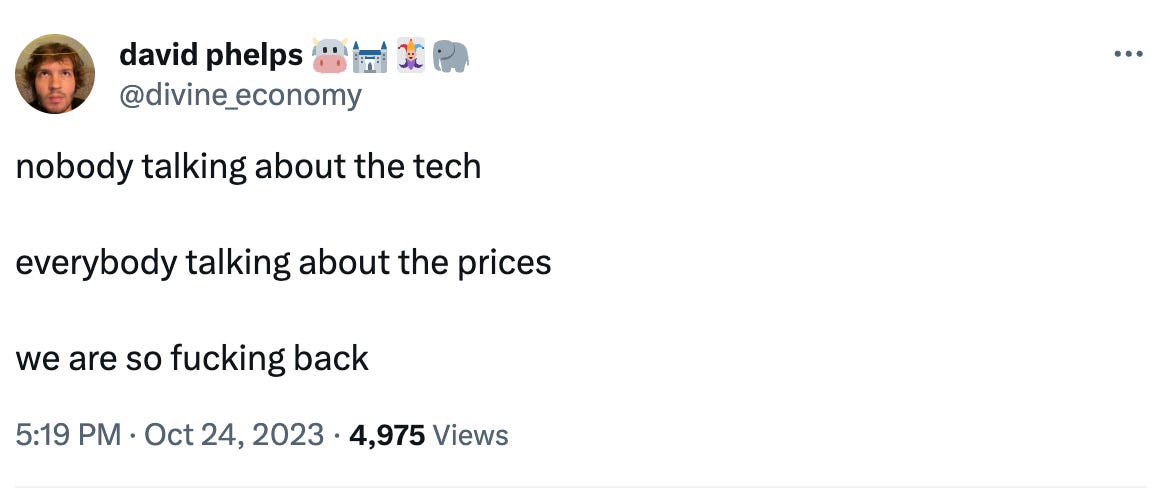🗳 This Week in Governance - October 26: Governance is Social (and Programmable)
A weekly resource covering crypto governance, politics, and power.
📣 Key Points
Hats Protocol launches Modules
ENS funds meta-governance
Aave takes a half-step to governance V3 activation
dYdX considers social mitigation for MEV
Lido discusses dual governance, again
Voting Activity (L7)
🗳️ 66,927 ballots
👥 20,263 voters
📜 227 proposals
🌐 76 active DAOsQuery more data using the Governance API
Let’s get into it 🔥
📰 News
Hats Protocol launches Modules
Hats on October 25th launched Modules, which enable the creation of programmable extensions for roles in (programmable) organizations such as DAOs. These modules can automate the granting and revocation of roles and permissions based on various criteria such as token holdings, contributions, and more. Users can now build, distribute, and share their modules in the Hats Modules Registry, fostering a modular environment for decentralized organizations.
📜 Proposals
Recently Closed
ENS: Funding Request: ENS Meta-Governance Working Group
The ENS Meta-Governance Working Group requests funding to support operations until March 2024, eliminating the need for funds in the January 2024 Funding Window. This funding supports various initiatives, including steward and secretary compensation, governance initiatives, DAO tooling development, DAO event sponsorships, and discretionary funds for new initiatives and governance experiments. The expected expenses through March 2024 total $376,000 in USDC, 40 ETH, and $52,300 worth of $ENS. Although some incisive questions were posed during discussion of the proposal, it ultimately passed on October 25th with 81% voting “for.”
Ending Soon
Aave: Governance V2.5 Activation
The proposal suggests a partial activation of Aave Governance v3 in an interim Aave Governance v2.5 version, excluding the new voting mechanism and assets but retaining other components like a.DI, Governance v3 execution layer, and Robot. This adjustment is motivated by issues with the voting assets implementation in a previous proposal. The migration to v2.5 involves moving Level 1 permissions of Aave ecosystem smart contracts to v3 Executors, funding a.DI, Aave Robot, and the Aave Gelato gas tank, while excluding certain elements from the previous proposal to simplify the transition. The voting period closes on October 28th.
Upcoming
Nouns: Nouner Scout Rounds
The proposal suggests conducting three experimental rounds of a "Prop House" program to attract long-term aligned contributors to Nouns. Participants can submit proposals over two weeks, with voting taking place over one week. The proposer with the highest votes will receive one Noun. If the experiment is successful, it may lead to ongoing rounds to allocate Nouns from the treasury. Voting opens on October 28th.
🎙️ Rather Listen?
The Boardroom Roundup brings you the latest DAO news headlines and governance proposals every week:
Subscribe to the Boardroom Podcast → Apple | Spotify | Google
📚 Reads
Designing Reward Systems for Web3 Governance, by Eliza Oak
The Balkanization & Babelification of the Internet, by Ruby Justice Thelot & Rue Yi
Collaboration Cookbook, from Metalabel and FWB
Five things every new DAOist should know, from Bankless Publishing
Feels like Arbitrum has the busiest forum in crypto rn, from Tnorm
🎧 Listens
Designing Governance Games w/ David Phelps, on StablePod
Optimism RetroPGF Round 3 with Jonas Sieferth, on Green Pill
💬 Forums
Arbitrum: ThankARB: A Strategy, Framework, & Platform for Arbitrum’s Success
This post from Disruption Joe outlines the ThankARB strategy for the Arbitrum ecosystem, aiming to guide grant framework design, facilitate coordination among stakeholders, and offer a clear direction. It highlights the importance of a strategy that involves the community and focuses on key strategic priorities. The strategy consists of three components: Strategic Diagnosis, 4C Strategy Policy, and Strategic Actions, and is designed to harness community competence for the ecosystem's benefit. Plurality Labs invites others to join this strategy, ensuring coordination and coherence.
dYdX: v4 Social Mitigation Strategy for MEV
Reverie has posted a proposal to address the potential for Miner Extractable Value (MEV) in dYdX v4 through a social slashing strategy. The strategy involves a committee proactively monitoring and reviewing onchain behavior, recommending actions to mitigate MEV. The committee's recommendations will be subject to community governance, and by the end of its term, a framework for standardized retroactive action will be presented. This approach aims to deter malicious actors while protecting honest validators from false positives and does not involve direct protocol changes.
Gnosis: Extend Gnosis DAO with EIP-4824
The proposal suggests adopting the EIP-4824 standard for Gnosis DAO without altering its governance or smart contracts. EIP-4824 establishes a common interface for DAOs to self-publish information, making it easier for tools to interact with Gnosis DAO contracts and enrich on-chain data. The move aligns with various industry leaders' broader adoption of EIP-4824 and is supported by DAOstar, a non-profit building standards for DAOs.
Lido: LDO+stETH dual governance (continuation)
This post discusses the development of a dual governance system for the Lido protocol, aiming to address a principal-agent problem between LDO token holders and protocol users. It highlights the challenges of so-called “foot voting” and outlines the proposed mechanism design, which includes improved alignment between DAO and users, extended timelocks, and enhanced exit options. The post emphasizes that dual governance is a step towards reducing governance risks and invites community feedback. Further research directions include improving foot voting by node operators and exploring non-token and hybrid governance.
Uniswap: [RFC]: Delegation of UNI to Active but Underrepresented Delegates
Doo Wan of StableLab posts here to observe that, despite its status as a prominent DeFi protocol, Uniswap's high-voting power has not translated into active governance participation, with many top delegates having less than 50% vote participation. To address this, StableLab’s proposal suggests allocating 2.5 million UNI to three active yet underrepresented delegates, provided they maintain a 90% participation rate. This move aims to enhance governance activity and accountability. Additionally, specific participation and application criteria have been outlined, with a process for selecting the delegates via Snapshot and onchain votes.
👀 Boardroom in Action
Synthetix: Comprehensive Profiles for Council Members
Explore how Synthetix and Boardroom Governance API are redefining governance transparency in DeFi with their Synthetix profiles utilized in their governance councils.
👉 Check out our Synthetix Case Study
💭 Ecosystem Take
🎈 Have a Meme
📮 Stay Up to Date
Follow us: Twitter | Discord
Subscribe to: Newsletter | Mirror | Apple | Amazon | Spotify






